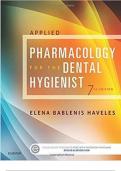Exam (elaborations)
Test Bank For Applied Pharmacology for the Dental Hygienist, 7th Edition by Haveles All Chapters Covered Latest Complete Guide A+
- Course
- Institution
- Book
Test Bank For Applied Pharmacology for the Dental Hygienist, 7th Edition by Haveles All Chapters Covered Latest Complete Guide A+
[Show more]



